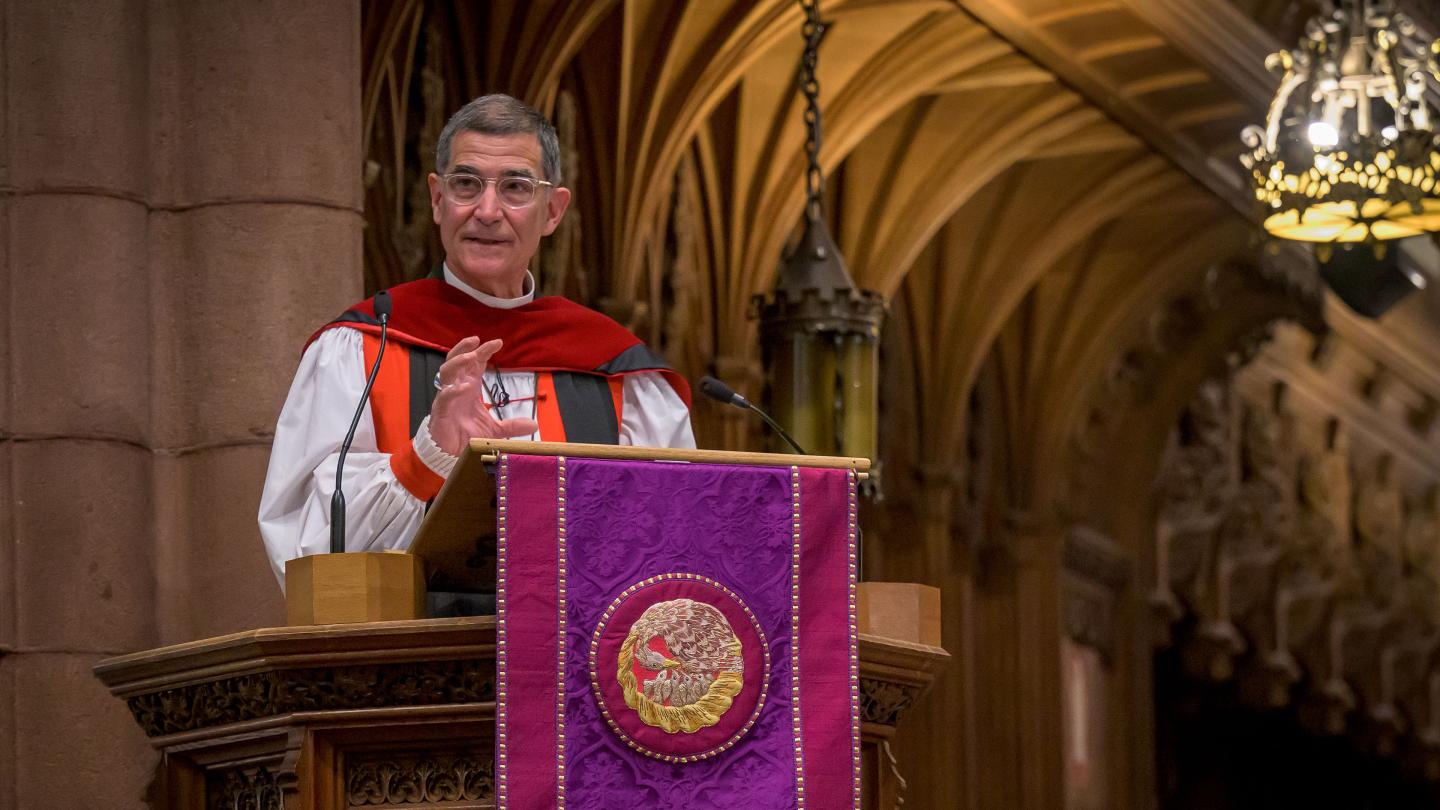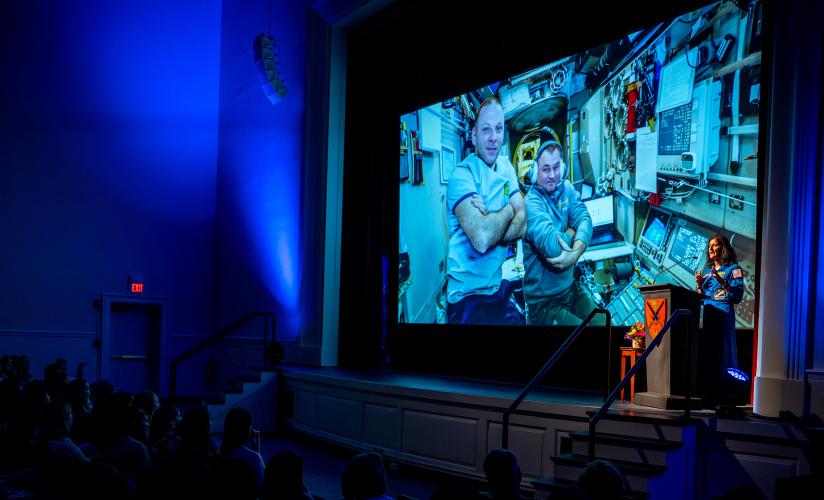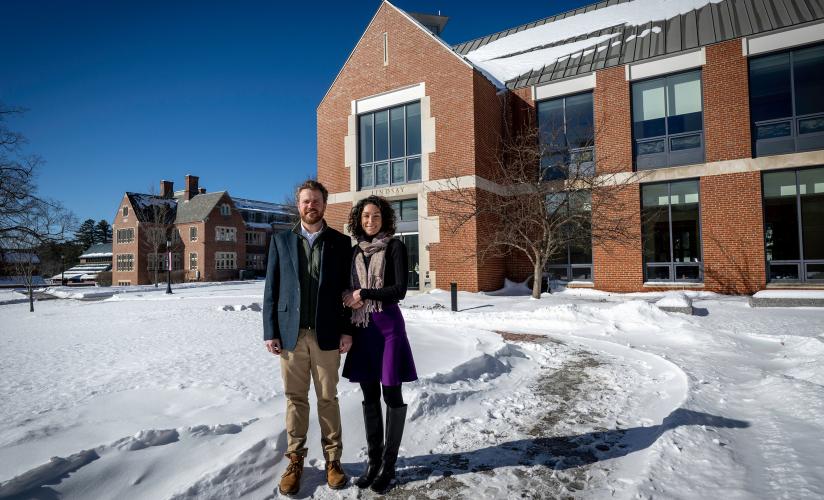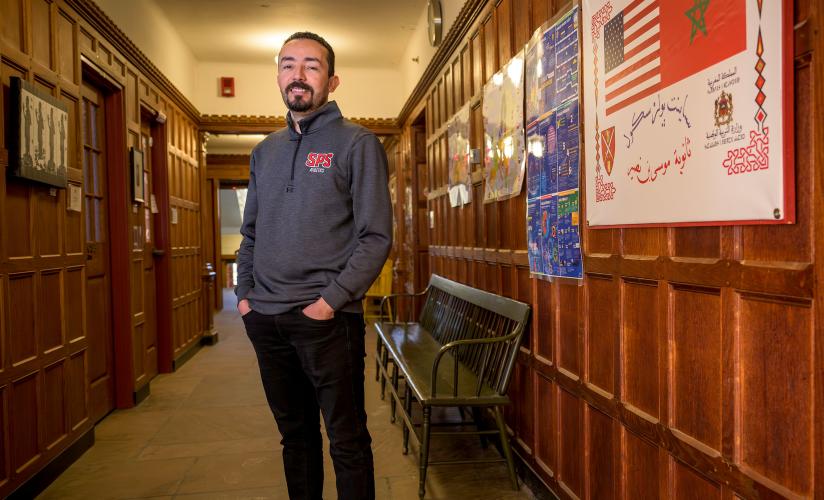

The Rt. Rev. Bishop A. Robert Hirschfeld, 10th bishop of the Episcopal Diocese of New Hampshire, shares a message on how to dare greatly to dream, hope and engage.
Welcome back to this campus that hasn’t quite shed all of its icy cloak. Not only St Paul’s, but all New Hampshire, has been waiting for your great enthusiasms and fervent energies to melt all the vestiges of the winter and to be harbingers of spring. Thank you for returning. And thank you Head of School Giles and Chaplain Wydner for the honor of inviting me to return to share a thought or two on the theme of “Daring Greatly to Dream, Hope and Engage.”
I wonder how the readings we just heard land in your ears this morning. Michelle Obama’s call to live without fear and to not be afraid resonates with me, because, well, I know fear. I think about fear a lot. It occurs to me in preparing these remarks that anyone who makes religion or spirituality their occupation is probably doing so because fear — the facing it, the study of it, the dissolving it, the striving to live free of its constraints — is at the core of all religious teachings, no matter what faith. Fear is woven deep in the human experience. Fear of death, of pain, of injury, of losing our loved ones. These probably represent our most obvious or ultimate fears. For most of the people I know, those things do indeed scare and trouble them, but what really terrifies them to the point of driving them to distraction and stealing them of their joy and happiness is another terror. It’s the fear of failing, the fear of seeming a fool, a moron. Most of us are afraid of looking silly, unworthy of dignity. Who wouldn’t avoid being seen wrong or weak? Or on the receiving end of insult? The fear of not keeping up our appearance of competence or attractiveness can rob us of our joy, inner peace and balance.
In fact, our fear of these things can make us so uncomfortable that we don’t even want to come close with those persons tainted with failure, weakness or flaws of appearance or character. We fear that by even getting close to shame, it will somehow rub off on us, contaminate or infect us by association. I consider it nothing less than tragic that the great religions of the world, my own definitely included, have been so twisted and distorted so as to endow fear of the “other” with a kind of power that creates notions of the unclean, outcasts, untouchables, undesirables. Labeling others as inferior, out of our own fear of the unknown, is the first step to oppressing others, destroying community and threatening all sense of the holy in the human. That fear is at the root of unimaginable and historic oppression.
Wouldn’t we rather live in the way that Michelle Obama and Theodore Roosevelt describe: with daring, with courage and a freedom that allows one to give it all for the sake of a cause larger than oneself? But it can’t really happen until we loosed our tight-knuckled grip on reputation, or status. Freedom and joy is in that loosening. There’s a lightness to living that way, a lightness of being, a kind of ease with which to move in this world. I want that, and I admire it in others who have it. But too often fear ensnares, makes us timid, terrified of making a mistake. I attribute my own failure to learn a language better than I have, or my failure to learn to play a musical instrument to my own fear of making a mistake or sounding foolish, and so there you have it. I so admire those of you who have broken through that barrier and do it every day in order to learn something new and bring goodness into the world. As an aside, I wonder if our nation’s failure to move into a space of more racial harmony and inter-religious, interethnic understanding is, at its base, a fear of making an error or being awkward in a culture of offense that shames in judgement rather than converses with the presumption of mercy and grace. How to dream hope or engage big when too often we find ourselves trapped in feeling pretty small?
So the theme is daring greatly to dream, hope and engage, and it’s taken me to addressing fear. Michelle Obama and Theodore Roosevelt are no slackers. They are among the highest achieving personalities in our nation’s history. They have been revered, admired, emulated, listened to for, well, in Roosevelt’s case, over 100 years. Great people. People who have faced down fear and timidity.
No doubt there are persons in this Chapel who are headed to those heights. We’ll be reading of your achievements for the benefit of our society in years to come. Who knows who among us that will be? But that’s not the kind of “boundless promise” or “triumph of high achievement” that I’ve come to speak about…at least I don’t think so. But congratulations in advance, anyhow, whoever you are.
Our doorway and portal to great dreaming, hoping and engaging is not in the attainment of fame or office, rank or status or power or dominance over others. I more and more believe that it’s in becoming freed from our most debilitating fear which is the fear of shame, of humiliation of being or even appearing wrong. That’s a fear I’ve had a small measure of success in moderating and being healed from. Mostly it comes from learning to fall, learning to fail, learning to risk being clumsy, even lost. Learning to accept your neighbor, and yourself, with mercy.
One of my favorite characters in recent literature comes not from a book that they assign in my course work in English or Comparative Literature. It comes from the work of the celebrated Canadian detective novelist Louise Penny. She writes mostly about a small fictional town in the Eastern Townships of Quebec called Three Pines. It contains a small café with good food, an inn, a few artists and some eccentric characters. Three Pines is the setting of some crimes, usually murders, sometimes even sinister geo-political plots, so you can’t call Three Pines a quaint village. Anyway, the hero of these novels is a gentleman named Chief Inspector Armand Gamache, who works for a kind of Canadian version of the FBI: the Montreal Securité. Gamache is no superhero, really, nothing physically or intellectually outstanding. He’s just an average fellow who shows up, is curious, kind, faces personal demons and dilemmas, disappointments. But there’s a sense of decency about him that fascinates me. He’s not a hardboiled tough guy or calloused like so many in the detective genre of literature. Book reviewers have pondered if the popularity of Penny’s novels has to do with the deep thirst our society has nowadays for just basic decency, even among broken and flawed human beings — particularly men — in our culture. That thirst for decency might also explains the runaway popularity of Ted Lasso.
Anyway, Gamache always seems to find the culprits, despite making some blunders and mistakes along the way. His trainees and those who surround him sometimes ask him, “Inspector Gamache, how do you keep going? What gives you hope, and purpose, what keeps you hopeful, despite everything seeing the worst in people?” They seem to ask him for the secret recipe for his success, his gentle greatness, if you will. Nowadays we hear people speak of having a super-power. And invariably, he answers with four simple sentences:
Are you ready? For Armand Gamache’s secret to daring greatly to dream, hope and engage?
Here are his four sentences:
I was wrong.
I am sorry.
I don’t know.
I need help.
Mostly likely, employing these statements won’t make you look good like either Michelle Obama or Theodore Roosevelt in the short run. They are not glamorous, or particularly brilliant. But what thorny knot in a relationship, or a decision, what roadblock in self-awareness, what political quagmire could not be significantly resolves, melted, lessened and put at ease if more and more of us, could learn to utter these statements with integrity of character and soul? “I was wrong. I am sorry, I don’t know. I need help.” Underneath and behind these sentences is an unmistakable courage, an inner security and strength, a fearlessness. There’s an unspoken and resilient hope and the fierceness with which to engage in relationship — not only with others, but even with the whole Created order that longs to be healed. Imagine humankind saying to the Earth, “We were wrong. We’re sorry. Teach us. We need help.”
Of course, the story I come back to every year at this time is the story of Jesus, who we are told never sinned, never made a mistake, though there are some legal and religious trespasses with which his opponents ensnared him. In the end Jesus is utterly free of fear, not only of agony, pain, even death, but from the debilitating need to keep up appearances, to look good, right, proper. The poet W.H. Auden ends a poem about the 20th century pastor Dietrich Bonhoeffer, who was martyred by Nazis, Christian Nationalists, in the final days of WWII. The poem, “Friday’s Child,” is a meditation on the spiritual freedom that God longs for us all to enjoy and how that freedom offered on Good Friday. The final stanza reads:
Meanwhile a silence on the cross
As dead as we shall ever me
Speaks of some total gain or loss
And you and I are free
To guess from that insulted face
Just what Appearances he saves
By publicly suffering
A death reserved for slaves.
So allow me to bless you and I have come to bless every congregation in New Hampshire — the “Live Free or Die” state:
Live without fear
Your creator has made you holy, has always protected you. And loves you with a power and presence that is stronger than death.
And the blessing of God be among you this day, this Spring Term, and forever more.



